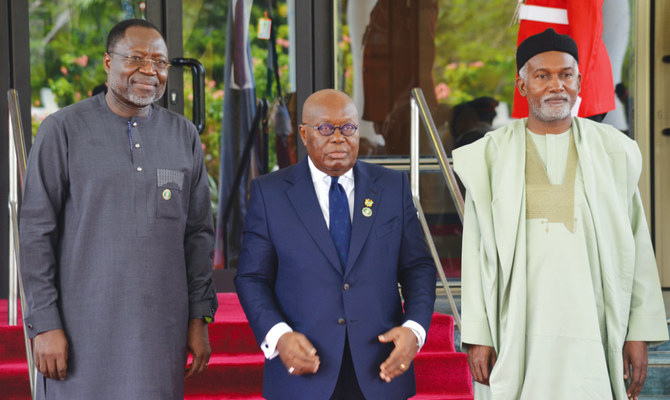DAKAR: Senegalese President and West Africa’s ECOWAS “facilitator” Bassirou Diomaye Faye called on Monday for dialogue and peaceful reconciliation with three countries that recently split from the bloc.
The military leaders of Niger, Mali, and Burkina Faso broke away from the Economic Community of West African States earlier this year. They formed a confederation of their own on Saturday.
ECOWAS heads of state met in Abuja on Sunday. They deplored the “lack of progress in interactions” with Burkinabe, Malian, and Nigerien authorities, who came to power in recent coups.
“We cannot stand idly by,” Senegal’s President Faye said in a Monday video.
“Our responsibility is to work on bringing everyone closer and reconciliation — to ensure there is room for dialogue,” he said, hoping the bloc will work toward peace.
The three countries’ decision to leave was fueled in part by their accusation that France was manipulating ECOWAS and not providing enough support for anti-terrorism efforts.
ECOWAS has warned the region faced “disintegration,” though its efforts to bring the seceding countries closer so far have failed.
Burkina Faso, Mali, and Niger have called their withdrawals “irreversible.”
ECOWAS appointed Senegal’s president as a “facilitator” in negotiations with the three states, alongside Togolese President Faure Gnassingbe.
President Faye stressed that, on paper, Burkina Faso, Mali, and Niger remain members for another year, as per Article 91 of the organization’s founding treaty.
“I hope that by the end of the (one-year) notice period, we will have had enough conversations to reconcile views and strengthen the organization so that it can better tackle our shared challenges,” Faye said.
ECOWAS announced on Sunday that it would draft a “prospective emergency plan” to “address any contingency” in the tense relations with the breakaway countries.
As a peace envoy supported by Togolese President Faure Essozimna Gnassingbe, Faye is seen as possibly the best among heads of state for a mission to try to woo the three nations back to the fold of regional cooperation.
Beyond the appeal of security and economic collaboration, ECOWAS’s goodwill has waned in recent years, said Afolabi Adekaiyaoja, a research analyst with the West Africa-focused Center for Democracy and Development.
But the new role offers Faye an opportunity to seek reforms for “a more sustainable and self-reliant” ECOWAS, Adekaiyaoja said.
Faye also represents the opposite of what the three military leaders claim they are against.
He had not been elected when ECOWAS, founded in 1975, imposed the severe sanctions on Niger following a coup last July. Niger cited the sanctions as one of the reasons for leaving the bloc.
Also, Faye’s victory in this year’s election, which was certified as credible, stood in contrast to rigged polls in the region.
At home, Faye is reviewing the old ties that the junta leaders claim have stifled West Africa’s development, though Senegal remains a key ally for the West.
Under Faye’s leadership, Senegalese officials are renegotiating contracts with foreign operators in the country and, according to Finance Minister Abdourahmane Sarr, are “aiming to free ourselves from the ties of dependency in our public policies.”
It is exactly what the junta wants to hear, analysts say.
Since ousting the democratic governments of Mali, Burkina Faso, and Niger, the generals have severed military and economic ties with traditional Western partners such as the US and France, saying they had not benefited their countries.
The shift has opened the window for Russia to expand its regional footprint.
“Like the other heads of state, he (Faye) claims sovereignty and a break with the old order,” said Seidik Abba, a Sahel specialist and president of the International Center for Reflection for Studies.
Age is also not just a number in the case of Faye, a former tax inspector.
Even as the youngest president in Africa, he is still older than three of the four current military leaders in the region.
At Sunday’s ECOWAS meeting in Nigeria, Faye was still among the youngest.
Across him was Ghana President Nana Akufo-Addo, who at 80, is just four years younger than Faye’s father.
When he visited Nigeria in May, the Senegalese leader touted his age as an “asset” that can help open a window for dialogue with the neighbors.
According to Abba, the Sahel specialist, Faye’s task to dialogue with the three countries would still not be easy. He said the three have wider concerns about the operations of ECOWAS, which they say faces interference from foreign countries like France, their former colonial ruler.
There is also a question of how much freedom Faye and the Togolese president would have as envoys under an ECOWAS that has just reelected Nigerian President Bola Tinubu as its chairman.
Their success would depend on “how best the different leaders can coordinate and agree” on the issues, said Adekaiyaoja from the Center for Democracy and Development.


























